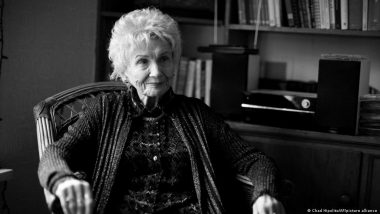Acclaimed author Alice Munro was the first Canadian to win the Nobel Prize in literature. Her collections of short stories were celebrated for their complexity and authenticity. She died at the age of 92.One of the most esteemed contemporary writers, Canadian author Alice Munro, has passed away at the age of 92 in her home in Ontario, a spokesperson for her publisher confirmed on Tuesday.
Also Read | India News | Tripura: Convict Serving Lifetime Imprisonment Escapes from Bishalgarh Central Jail.
A titan of short-story writing, Munro revolutionized the architecture of short stories and demonstrated that the format was worthy of the Nobel Prize. She published 14 original short-story collections and several short-story compilations. With this body of work, she became the first Canadian to receive the Nobel Prize in Literature in 2013.
Also Read | India News | LS Polls: Punjab CEO Sibin C Releases Final List of Total Voters in State.
"Dear Life" was the title Munro gave to her last work, a 2012 collection of short stories. Some of the stories were inspired by the author's own life. Other stories also explored the destinies of women, but it never felt as if feminism was the main issue.
Bad books inspired her to write
Born Alice Ann Laidlaw on July 10, 1931, in Ontario, Munro began writing as a teenager and published her first story, "The Dimensions of a Shadow," in 1950. During her studies in English and journalism, she met the man who would become her husband, James Munro. The couple moved to the west of Canada, where they opened a still-running bookstore, Munro's Books.
While she first concentrated on raising her three children, Alice Munro devoted herself to her writing by the end of the 1960s. According to Jim Munro, reading some of the books inspired the author to return to her own stories: "I can write better books than this!" she said.
She was right. Her first collection of short stories, "Dance of the Happy Shades" (1968), was received with wide acclaim, winning the Governor General's Award — Canada's highest literary prize at the time.
Building on a simple story
Munro's stories combine linguistic and emotional density. They typically revolve around a series of recurring themes. They're about women in Canada, mothers and daughters, who grow up, fall in love, and experience the beautiful and tragic sides of life.
"What makes Munro's growth as an artist so crisply and breathtakingly visible […] is precisely the familiarity of her materials. Look what she can do with nothing but her own small story; the more she returns to it, the more she finds," wrote the US author Jonathan Franzen about her, a decade before she won the Nobel Prize.
His piece in the New York Times listed reasons why he felt "her excellence so dismayingly exceeds her fame."
A whole life on a single page
Munro wrote "about unfulfilled desires that are carried through one's life, and how people deal with them. It's the small details that made her so great," said Hans-Jürgen Balmes from the publisher S. Fischer, which distributes Munro's books in Germany.
She mastered "the art of capturing the entire life of a human being on a single page," literary critic Sigrid Löffler told DW on the occasion of her 85th birthday. She filled "her stories, which are often no longer than 20 to 30 pages, with more life than many 700-page works."
Her books turned into bestsellers in Canada and the UK, and she became extremely popular in Germany after winning the Nobel Prize.
Adding value to the short story
The author long wrestled with the notion that short stories were generally seen as a minor genre by literary critics, a preliminary step leading to a novel. "How I tortured myself trying to write a novel! Until I one day realized that short stories was the most appropriate format for me," she once told German weekly Die Zeit in a rare interview.
As a specialist of the short story, even her book "Lives of Girls and Women," told through one single character, was rather considered a short story cycle and not a novel.
She won the Man Booker International Prize in 2009 for her lifetime body of work, which includes "The Love of a Good Woman" (1998) and "Runaway" (2004). She was also awarded several other prizes and honors, topped by the Nobel Prize in 2013.
In her last collection, "Dear Life," she hinted that the book could well conclude her career as an author, adding a coda to the last four stories: "I believe they are the first and last — and the closest — things I have to say about my own life."
With the last sentence in one of those final stories, "Night," the master of the short story offered a peaceful farewell: "From then on I could sleep."
Edited by: Carla Bleiker, Louisa Schaefer
(The above story first appeared on LatestLY on May 14, 2024 11:20 PM IST. For more news and updates on politics, world, sports, entertainment and lifestyle, log on to our website latestly.com).













 Quickly
Quickly




















